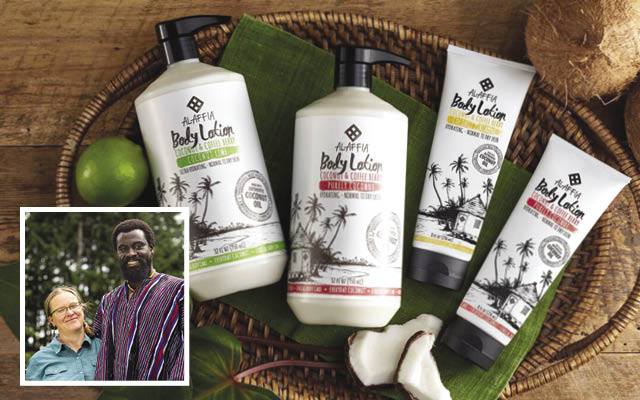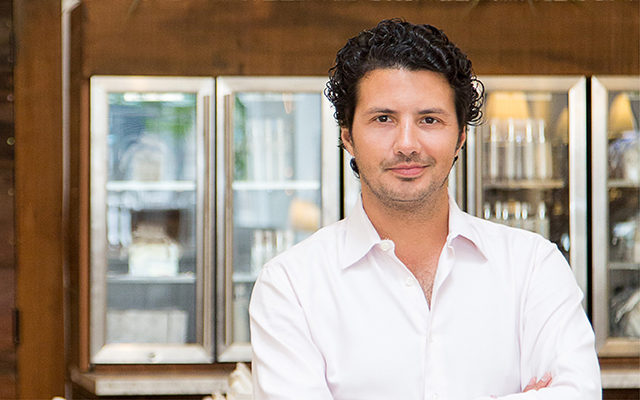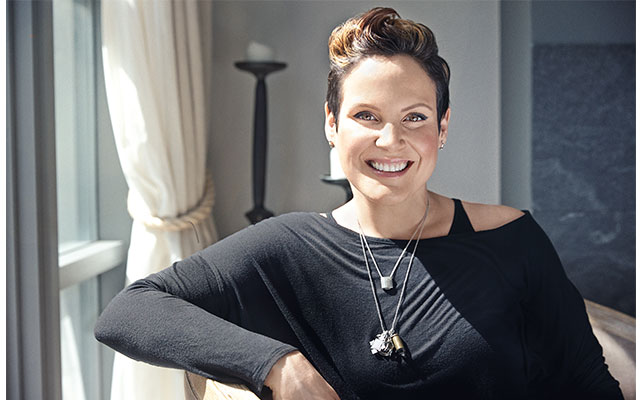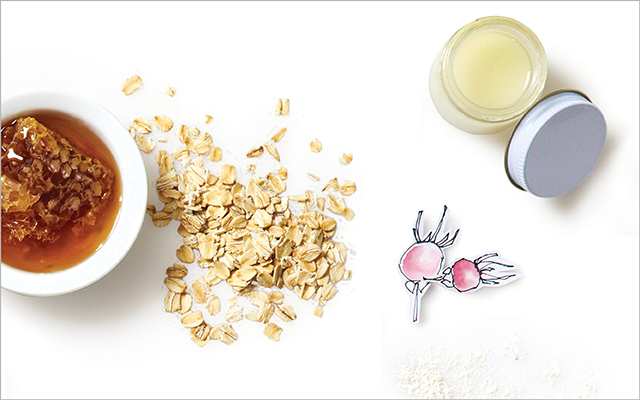The natural-beauty-care line Alaffia was born as a labor of love after its founders, Olowo-n’djo Tchala and Prairie Rose Hyde, met in Tchala’s home country of Togo in 1996 while Hyde was stationed there in the Peace Corps. The couple moved to California in 1998 with the shared goal of creating a company that could help alleviate poverty in West Africa.
Alaffia (pronounced “ah-la-fee-uh,” a common greeting in Togo that means a state of peace, health, and well-being), which has a product line that covers a wide range of skin and hair types and uses fair-trade unrefined shea butter and coconut oil, has since established multiple charitable and empowerment projects to benefit schools, maternal health, and reforestation. The product line has expanded since the first shea-butter cooperative was established in 2003, and is now the No. 2 personal-care brand at Whole Foods Market.
We connected with Tchala and Hyde to learn more about their business.
Experience Life | Why did you choose beauty care and personal-care products as a way to help alleviate poverty in West Africa?
Olowo-n’djo Tchala | Since childhood, my mother instilled in me a responsibility to use my opportunities for the benefit of the less fortunate. After I moved to the United States with my partner, Rose, we saw the potential value of handcrafted shea butter in Western markets.
Prairie Rose Hyde | To add on to that, as a Peace Corps volunteer in Togo, I learned that what would be most useful to the farmers I was working with was providing information on how to access those markets and sell their materials for fair prices.
OT | The plan was to provide that information and help these women mobilize their resources to be sold at fair-trade prices. We couldn’t find any buyers willing to do so, so we decided we’d have to do it ourselves.
EL | How has the brand evolved over the years? Why were unrefined shea butter and coconut oil important ingredients for your line?
OT | Our goal in creating Alaffia was to alleviate poverty — and also show to the world the value of traditionally made ingredients. Women such as my mother, who are not able to participate in the Western education system, have no opportunities toward economic benefit because they can’t read and write. And I don’t think we [Togolese] can get out of poverty unless they can participate. Alaffia allows them to do so.
PRH | We’ve come a long way in the past 15 years. And we’ve had to learn along the way through trial and error. Some of Alaffia’s first products were inspired by our daughters, Abi and Yemi, who have very textured hair, and others were to try to meet the needs of our customers.
Our focus is shea butter, coconut oil, and black soap for several reasons: Shea and coconut trees grow wild, and their fruit can be extracted and replenished in a sustainable way. At the same time, as Olowo-n’djo was saying, Togolese women have been making these ingredients for centuries. Rather than teaching a completely new skill, we are able to use local resources and traditional knowledge for the benefit of communities.
EL | Several of the charitable projects benefit women and children in West Africa. Why did you target these demographics?
OT | Looking at the long-term sustainability of Togo, it’s essential that the most basic needs of its people are met. This means investing in mothers — in women and their children. Healthy mothers means they will have healthy babies, and healthy babies means those who are able to learn. Additionally, children need to be given educational opportunities if they are to lead and be players in an increasingly global world. I remember yearning to go to school as a child; I know what a difference it makes to be granted that chance at life.
EL | Olowo-n’djo, part of your life story includes dropping out of school in sixth grade so that you could work on your family’s farm, where you lived in an 8-by-10-foot one-room home with your mother and seven siblings. What lessons did you learn that translated to your personal and work life today?
OT | Dropping out of school was very hard for me, but coming from such a large family, I understood that there simply weren’t enough resources to go around. Coming from a family with 41 brothers and sisters (my father had multiple wives), the importance of putting others’ needs before your own is a fundamental part of your life. As hard as it was to leave school, I understood the responsibility I had to my family.
This translates to Alaffia when we refer to all who are part of Alaffia’s mission as our family. A family looks out for one another. And Rose and I feel that alleviating global poverty is something that needs to be pursued together. This core value, that I learned from a young age, is integral to what we do.
PRH | I would also add that having to drop out of school gave Olowo-n’djo an appreciation for the privilege of a formal education system — something we tend to take for granted here in the United States.
EL | Alaffia’s business model includes a social-enterprise approach, and notes credentials like Fair Trade and Fair for Life, a renowned international inspection and certification from ECOCERT for organic and social accountability. Why are these certifications important to Alaffia’s mission?
PRH | Transparency ensures that all players — from the individual shea-nut collectors to Alaffia shea-butter processors and management to the ECOCERT inspectors — see and understand the same things. It ensures collectors know the price they receive and understand the principles of fair trade. It ensures Alaffia shea-butter producers understand their rights to fair wages and safe conditions as well as their responsibilities for quality production. Furthermore, transparency ensures that our friends and customers can truly see and verify what we do.




This Post Has 0 Comments